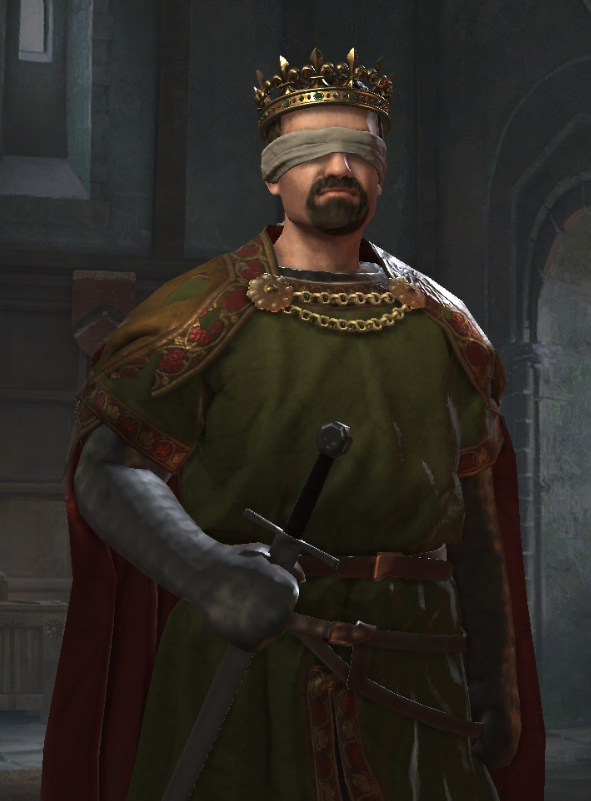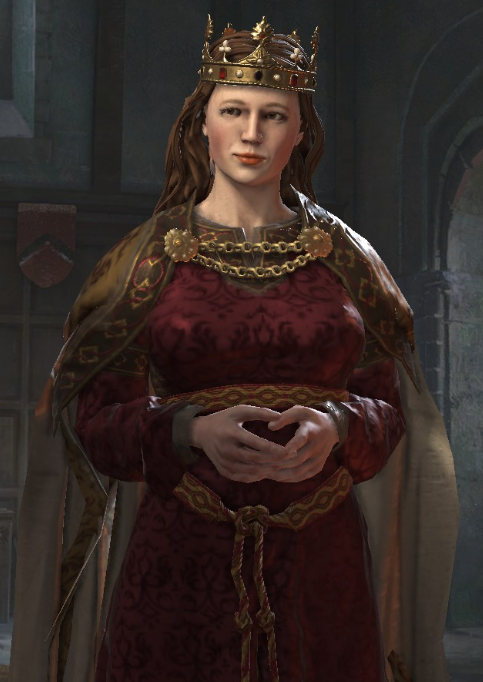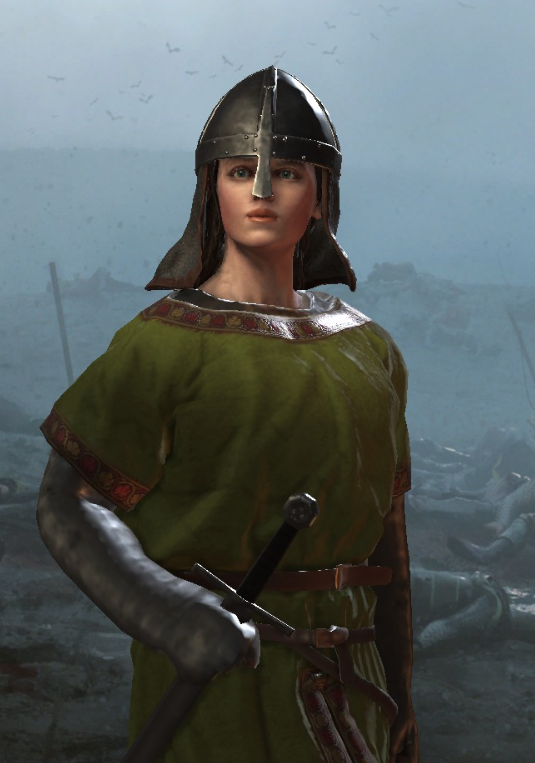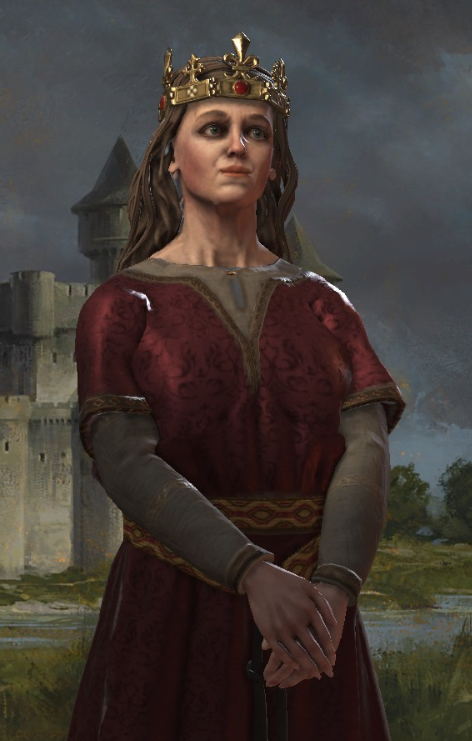The Larian Chronicle - Gerome Delaunay's Writings
These are the writings of the chronicler Gerome Delaunay and other chroniclers who followed suit of King Gabriel's reign. Unlike many chronicles and documents in Lisanrik, which follow individual kings, the goal is to provide a timeline of the Kings of the Goth people by following the dynasty of House Larian. This timeline uses the calendar used by the great oracles of Madeci.
It is my hope that future chroniclers, who are following our excellency Gabriel's timeless charter, would continue to add contributions to the history of our people, as well as mark their names to bring a consistent chronicle. Many blessings of Amagus to those who do.
 In the years 4260 to 4262, the blind prince Gabriel took upon the throne of his mother and brother. In those days, Ieasbreda bribed the lords of Diede-Hofen and was thus declared their king, as she claimed to be of the House of Larian. A Kingdom of Halfia was formed, declaring independent of Larian. The Kingdom of Larian, however, could not accept this rebellion, and thus rallied the troops to fight off the pretender queen. After an initial skirmish for Courtia, Gabriel was forced out of his holding there and fled toward Fenestein. A short peace was declared. Thus Ieasbreda was declared the Queen of Halfia.
In the year, 4263, the King and his court went through their humiliation and prepared to strengthen the borders of their holdings. King Gabriel emptied his mother's treasury to the last dime to invest in the building of castles toward their vulnerable cities, such as Laketown, Brauxerr, and Vine.
In the years 4260 to 4262, the blind prince Gabriel took upon the throne of his mother and brother. In those days, Ieasbreda bribed the lords of Diede-Hofen and was thus declared their king, as she claimed to be of the House of Larian. A Kingdom of Halfia was formed, declaring independent of Larian. The Kingdom of Larian, however, could not accept this rebellion, and thus rallied the troops to fight off the pretender queen. After an initial skirmish for Courtia, Gabriel was forced out of his holding there and fled toward Fenestein. A short peace was declared. Thus Ieasbreda was declared the Queen of Halfia.
In the year, 4263, the King and his court went through their humiliation and prepared to strengthen the borders of their holdings. King Gabriel emptied his mother's treasury to the last dime to invest in the building of castles toward their vulnerable cities, such as Laketown, Brauxerr, and Vine.
 Let it be known that in those days, Ieasbreda spread great slanders toward Queen Percival, declaring that she was also half-born like she and that the House of Ebenwald's claim on the throne of the Goths was strong. Thus, the king rose and demanded the great chroniclers of Fenestein into his court. It is where I, Gerome, was brought to record the histories of his mother and prove that her oath was upheld. The story of the Paladin Queen was thus recorded and remembered, though Gabriel himself could not read it.
In the year 4265, the king Gabriel and his queen Eleanor wed. In the following days they had many children. The most treasured was the eldest son, Philippe.
In the year 4270, the King Gabriel and his queen Eleanor faced a great famine in the land as a terrible winter overcame the people of Larian. Many complained of their hunger, so the king brought his royal reserves, emptying them dry, to provide food for his people. It was in those days that Halfia prospered, and the queen Ieasbreda taunted the King of the Goths.
In the years of 4270 to the years of 4275, King Gabriel sent out tax collectors to refund the royal treasury as the kingdom came into great debt. In the High Forests in the regions of Manneruck, a group of bandits arose to pillage these collectors and opposed the king's decrees. In the lands of Halfia, the rangers of Courtia also turned against the Queen Ieasbreda, declaring her a Lisanrikian pretender. And in her greed, the Queen of Halfia also sent out tax collectors and took great sums from the people of Halfia. She desired the rest of the Kingdom of Larian to unite the Goths under her crown.
Then, in the year 4276, a bard entered the court of King Gabriel and sang many songs in hopes to bring him utter cheer. His name was Blondel, and became a close advisor to the king despite relegated to the role of a jester. In this year there was also a great eclipse of the moon, it turning blood red.
It was in the year 4280 that a band of forest men plagued the forests along the river Vine. They stole from the people of Vine and grew quite wealthy. Their notorious leader Pierre mocked the King of Larian. Though the King's foresters and sheriffs tried to capture him, he evaded them deeper into the forests of the land. Thus King Gabriel issued a decree, ordering for their arrest.
In the year 4281 that the King of the High Elves, Lulach, came to the throne of King Gabriel and presented him a gift of mithril. Lulach praised the king for his enforcement of his forests and considered him elf-kin. Thus, the Mail of Lulach was prized by the court and the King presented it before the great houses of Fenestein.
It was in the days after 4281 that the king plotted to bring back the lands of Halfia into his domain. He plotted with Blondel the Bard, as well as his generals. Then the armies of Larian rode into the forests near Courtia. Yet Queen Ieasbreda's spies had reported his plan, and so the host of Larian was met by the Host of Halfia, and the armies battled near the fortress of Agin. The battle lasted for 9 days, until both armies tired, as they had failed to capture any hostages. Thus the hosts turned back to their homes.
In the days of 4282, the Prince of Larian, Philippe, was captured in a plot by the king's Arch-Magistrate, Augustin Sourin. The prince was polymorphed into a frog with his men and guarded by a dragon named Byldrax within the corridors of Castle Odo. The prince and his rescuers were ensnared within a realm of shadow for a month's time. It was in this time that King Gabriel had died, and quickly Ieasbreda of Halfia took his place to be the Queen of Larian, as Philippe had gone missing. Thus it was the October of 4282 that Ieasbreda became Queen of the Goths.
Let it be known that in those days, Ieasbreda spread great slanders toward Queen Percival, declaring that she was also half-born like she and that the House of Ebenwald's claim on the throne of the Goths was strong. Thus, the king rose and demanded the great chroniclers of Fenestein into his court. It is where I, Gerome, was brought to record the histories of his mother and prove that her oath was upheld. The story of the Paladin Queen was thus recorded and remembered, though Gabriel himself could not read it.
In the year 4265, the king Gabriel and his queen Eleanor wed. In the following days they had many children. The most treasured was the eldest son, Philippe.
In the year 4270, the King Gabriel and his queen Eleanor faced a great famine in the land as a terrible winter overcame the people of Larian. Many complained of their hunger, so the king brought his royal reserves, emptying them dry, to provide food for his people. It was in those days that Halfia prospered, and the queen Ieasbreda taunted the King of the Goths.
In the years of 4270 to the years of 4275, King Gabriel sent out tax collectors to refund the royal treasury as the kingdom came into great debt. In the High Forests in the regions of Manneruck, a group of bandits arose to pillage these collectors and opposed the king's decrees. In the lands of Halfia, the rangers of Courtia also turned against the Queen Ieasbreda, declaring her a Lisanrikian pretender. And in her greed, the Queen of Halfia also sent out tax collectors and took great sums from the people of Halfia. She desired the rest of the Kingdom of Larian to unite the Goths under her crown.
Then, in the year 4276, a bard entered the court of King Gabriel and sang many songs in hopes to bring him utter cheer. His name was Blondel, and became a close advisor to the king despite relegated to the role of a jester. In this year there was also a great eclipse of the moon, it turning blood red.
It was in the year 4280 that a band of forest men plagued the forests along the river Vine. They stole from the people of Vine and grew quite wealthy. Their notorious leader Pierre mocked the King of Larian. Though the King's foresters and sheriffs tried to capture him, he evaded them deeper into the forests of the land. Thus King Gabriel issued a decree, ordering for their arrest.
In the year 4281 that the King of the High Elves, Lulach, came to the throne of King Gabriel and presented him a gift of mithril. Lulach praised the king for his enforcement of his forests and considered him elf-kin. Thus, the Mail of Lulach was prized by the court and the King presented it before the great houses of Fenestein.
It was in the days after 4281 that the king plotted to bring back the lands of Halfia into his domain. He plotted with Blondel the Bard, as well as his generals. Then the armies of Larian rode into the forests near Courtia. Yet Queen Ieasbreda's spies had reported his plan, and so the host of Larian was met by the Host of Halfia, and the armies battled near the fortress of Agin. The battle lasted for 9 days, until both armies tired, as they had failed to capture any hostages. Thus the hosts turned back to their homes.
In the days of 4282, the Prince of Larian, Philippe, was captured in a plot by the king's Arch-Magistrate, Augustin Sourin. The prince was polymorphed into a frog with his men and guarded by a dragon named Byldrax within the corridors of Castle Odo. The prince and his rescuers were ensnared within a realm of shadow for a month's time. It was in this time that King Gabriel had died, and quickly Ieasbreda of Halfia took his place to be the Queen of Larian, as Philippe had gone missing. Thus it was the October of 4282 that Ieasbreda became Queen of the Goths.
Gerome Section
Chronicle of Percival the First
In the year of 4200, there was not one king over all the Goths. We were subjugated by the Nordic Mountain King for generations. The land was split thrice-way: the lands of Gotha, which were ruled by the city of the Four Swords, Fenestein, and their lords. There was Halfia, which had no king save for the Lord of Diede-Hofen. Then there was Manneruck, ruled by the Dwarf King Dirge. In the year 4210, the Dwarf King of Manneruck was disturbed by a popular warrior, who called himself Percival of House Larian, in the Lake Town. He inspired a popular rebellion, foretelling of a vision of a united kingdom for the Goths. This Percival gathered the towns of Manneruck and organized a resistance near the High Forests at the town of Dert. The Dwarf King sent his knights to capture him. It was during this time that the rangers sided with the knight as well, and thus fought off the dwarven warriors. In the winter Percival remained in the cold High Forests with a host of men.Sir Percival in her youth, dressed as a man in armor befitting of the Goths of this age. In this guise she led the united Goths against the Dwarven kings to gain their own sovereignty.
In the year 4211, the knight Percival and his host of a thousand men went up from Dert and gathered support of the people of Dunkoff. There she assembled more of her host. Then a spy of the dwarf king reported a great slander towards Percival, accusing him of being a mere girl. In this, Percival revealed that he was, indeed, a woman, and it was this fact that garnered the support of the host. After the slander was delivered to the towns of Manneruck, Percival began to style herself as Queen of the Goths. The great steel smiths of Fenestein, as a gift toward Percival, gave her a coat of plate, to which she promptly wore to prepare for battle.
In the year 4212, the host finally marched upon the city of Manneruck. It was in this the city guard, proud in their Gothan heritage, betrayed the dwarf king and opened the gates for the armies of Percival. The Dwarf king fled the city, leaving his possessions behind. His bronze crown taken and placed on Percival's, being declared the new Queen. The Dwarf king then presented himself to the Emperor of the Nords, Nordfili, and reported to him all the things that the Goths of Manneruck had done. This greatly angered Nordfili, who prepared his army to invade the city of Manneruck.
In the year 4213, Queen Percival swore an oath to the Gothan people, declaring herself a righteous paladin. She swore that she would fight the Dwarven Emperor even to her death. In this, she gave the Gothan people their proud motto, "all for one, and one for all." Then, during the summer of that year, Nordfili and his armies invaded Manneruck, leaving the capitol ablaze, but Queen Percival escaped his capture. She assembled a new host and travelled through the harsh winter to the Forests of Montou.
In the year 4214, the Norden army chased the host of Queen Percival toward the Dragonscale Mountains. They were led to a canyon, where the Gothan Host tricked the Norden army and surrounded them. It lead to a great slaughter. The knight George Mane, loyal to his queen, captured Nordfili and presented him toward Queen Percival. She then forced Nordfili to sign a treaty, proclaiming her the Queen of the Goths, but the Nord King only scoffed at her letter and swore false vows, declaring an armistice, as he threatened that his armies would regather to destroy her.
In the year 4215, Nordfili broke his armistice and invaded the lands of Manneruck. Queen Percival thus took up her sword and led the armies of the Goths toward the great dwarven host. It was in those days that the King of the Icenglav, Nicolai, remembered an old treaty and rallied his armies against the dwarves. Also the Danes had remembered their promise towards the men of Goth, and joined the host of Nicolai to distract the Dwarf Emperor. In the fall, the Icen-Dane alliance began to raid Gunnidalr. The Dwarf Emperor split his armies two ways. As the armies were chased by the Dwarves, the Goths and the Icen-Danes joined together at Vatlstein, and made a great offensive against Nordfili. The alliance struck true and once again captured Nordfili. Nordfili now accepted Percival as the true Queen of the Goths, and surrendered the holdings of Gotha and Halfia to her.
In the year 4216, Percival was crowned Queen of the Goths at the age of twenty. She hosted a great feast in celebration in the city of Manneruck. The feast angered the lords of Fenestein.
In the year 4220, the lords of Fenestein and the dwarves of Manneruck rebelled against the Queen's authority. She gathered her army and put down the lords of Feinstein. She then enacted a charter, demanding the beards of the dwarves and men that opposed her to be cut.
In the year 4221, Queen Percival courted the knight Odo of the House of Mane. In the same year they married.
In the year 4222, Queen Percival birthed a son named Percival. She called her house Larian, off the old name for the Duchy of Manneruck before it was controlled by the Dwarves.
In the year 4224, the Queen birthed twin daughters, named Belle and Joanne. In this year, the lords of Fenestein were ordered to submit to her authority as queen, and she moved her capitol to that city.
In the decade of 4230, the Queen had birthed her last son, Gabriel. The dukes of Halfia arose against the queen, and she smote them with her sword and her armies and forced them to submit as well. Then, she took the dwarves of Manneruck and reopened their mines, wishing for new gold and silver to be collected. She organized a great mint, to bring silver and cold pieces printed with her visage to be distributed to the Goths to remind them of their Queen. In this same decade, the Petty King of Brymoor, Geralt Ebenwald, entered her court and began to seduce her. She birthed him a daughter, whom she named Ieasbreda. This brought great strife to the kingdom, to which the King Odo threatened a divorce. She thus denounced the daughter and hid herself in the chambers of her palace for a year's time, in shame. [Editor's note: this story is disputed, believed to be merely a rumor spread by her enemies in those days after it was learned that Geralt Ebenwald had an illegitimate daughter, and she was believed to have been pregnant after the birth of Gabriel, but it was said to result in miscarraige.]
In the decade of 4240, the Queen ordered a charter where the coins of the old dwarf kings would be returned and melted to be reminted in her visage. With her gold reserves, she funded a reconstruction of the bridges and the roads within the land.
In the decade of 4250, the Queen's charter was nearing it's end as the great reconstruction project was completed. But the elder queen began to feel her health fading, and so prepared her eldest son Percival to become king. In the year 4256 she passed away, and a funeral in the city of Manneruck was done. Her eldest son Percival was then crowned the new King of the Goths.
Chronicle of Percival the Second
Short were the days of Percival the Second. Though a brave and courageous knight, he grew strife against his brother Gabriel, and the house was divided. Prince Gabriel was appeased however when his brother granted him the ruling as Duke of Courtia. Thus the brothers, though still envious of the other, ruled in co-existence to keep the lands in check. In the years 4257-4260, he continued his mother's work of reconstruction. His queen, Mariot, ruled by his side. However, there grew to be a plot between the House of Ebenwald and the House of Larian. Ieasbreda sent assassins to kill the kings of Goth. The first assault went against the prince Gabriel, who was blinded in his efforts to ward off his assassins. But Percival's guards, bribed by the House of Ebenwald, killed him in his sleep. Thus the lands of Goth went into turmoil and Gabriel was crowned the King of the Goths.Chronicle of Gabriel the First

King Gabriel by Paradox Interactive

Ieasbreda by Paradox Interactive






Comments